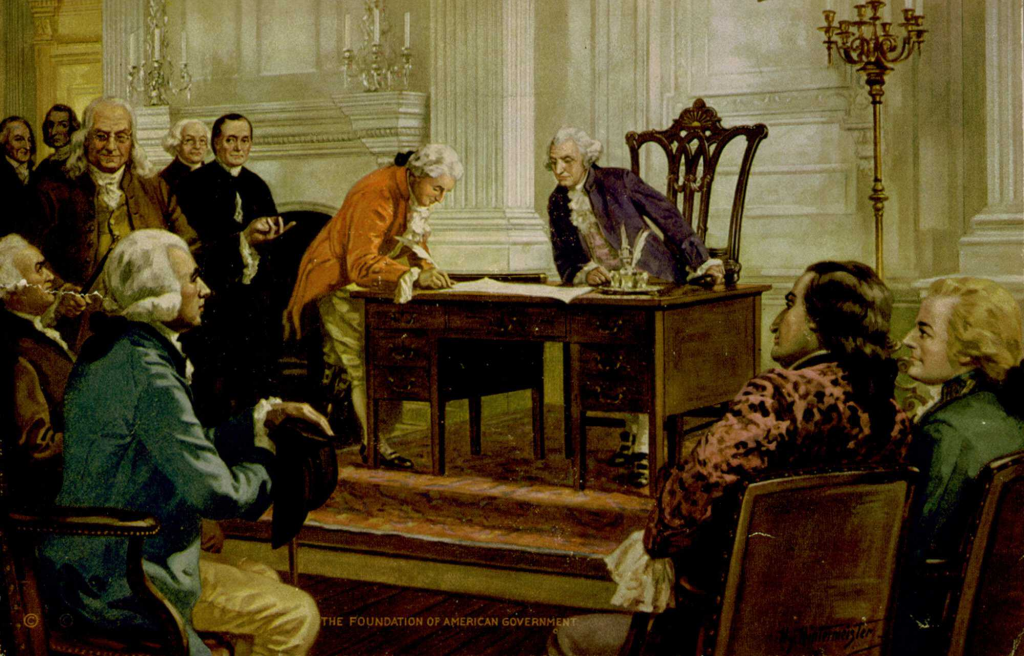In March 1797, John Adams and Thomas Jefferson found themselves in the highest positions of power in the United States: Adams as President and Jefferson as Vice President. Despite their ideological differences, the two had been personal friends for years. But as they reached the pinnacle of power, could their friendship withstand the political pressures? At first, it seemed so. When James Madison awkwardly informed Jefferson that his vote had placed him as Vice President instead of President, Jefferson took it in stride, even expressing his hope for Adams’ victory. “From the moment I began public service, he has been my superior,” Jefferson wrote, adding a heartfelt message of support.

“I never expected any other result… no one more sincerely congratulates you… I have no ambition to rule… It is a painful, thankless job… I sincerely hope that you can avoid the war that would ruin our agriculture, commerce, and credit. If you do, all the glory will be yours. Your government will be glorious, and you will be happy.” Jefferson’s letter, full of admiration for Adams, seemed to be a gesture of deep respect and goodwill.
However, Adams never saw the letter. Jefferson, always the political tactician, never sent it to Adams. Instead, he sent it to Madison in Philadelphia, asking him to review the letter and ensure it was politically correct. Madison was horrified when he read it, fearing it would harm Jefferson’s reputation and the political prospects of their party. “This is a terrible mistake! Do not send this!” Madison warned Jefferson. “You don’t need to remind Adams of your friendship. If he’s a bad president, this will only make us look foolish. It could ruin us politically.” Madison advised Jefferson to distance himself from Adams to avoid any implication of alliance.
The letter was never sent, and Jefferson’s reliance on Madison, his closest political ally, was undeniable. Just as Washington had relied on Hamilton, Jefferson trusted Madison to navigate the political landscape. The two shared a brotherly bond—Jefferson, younger than Madison by eight years, respected him greatly, and Madison’s judgment was key to Jefferson’s success. While Jefferson had a tendency toward romantic and impractical ideas, Madison was there to rein him in, ensuring their political moves were calculated and wise.
Amid the tense political climate, Adams began to consider an unprecedented political partnership. After Washington’s departure, the nation faced a daunting political vacuum. Adams, seeking to unite the country and heal the divisions between the Federalists and Republicans, hoped that by involving Jefferson, he could bring about a compromise between the two parties. At the heart of this was the “Jay Treaty,” which had resolved tensions with Britain but angered France. The French, feeling betrayed by the U.S.’s tilt toward Britain, had begun seizing American ships. Adams, aware of the crisis, saw an opportunity to bring Jefferson into his administration to help manage the escalating tensions with France.
But this idea was met with resistance. Jefferson’s ally, Madison, immediately rejected the notion, advising Jefferson not to cooperate with Adams. He argued that the Republicans’ goal was to take power, not to appease the Federalists. While Adams hoped to use Jefferson’s influence to foster unity, Madison was clear: “We’re not here to play games with them.”
In the end, Jefferson sided with Madison, rejecting Adams’ overtures. Their relationship, once close, quickly soured. Adams, feeling betrayed, found himself isolated within his own party. Despite the support of his wife Abigail and his son John Quincy, who played key roles in his political life, Adams struggled to navigate the fractures in his government.
Abigail Adams, a sharp political mind in her own right, became Adams’ closest adviser, often shaping his decisions with her insight. She played a pivotal role in keeping Adams grounded amidst political chaos. John Quincy Adams, though initially reluctant to enter politics, would go on to become one of the most significant figures in American history.
Through all the political turbulence, John Adams remained resilient. Despite the lack of a strong political party behind him and the constant battles within his administration, he persevered. His journey, marked by struggles with his own cabinet and party, showed the strength of his character. As Abigail famously said, “He is an oak, not a willow. He may be uprooted or broken, but he will never bend.”
Adams’ perseverance paid off. Though initially met with political resistance, his determination to continue his plans, including the mission to send a delegation to France, eventually won out. The trio he selected for the mission, including Charles Pinckney, would play a crucial role in shaping the next phase of American diplomacy.
In conclusion, the relationship between Adams and Jefferson exemplifies the complexities of political life in the early years of the United States. Their friendship, tested by power, political ambition, and national interest, shows how personal relationships often intersect with public duty. While their paths diverged politically, their contributions to the foundation of the United States remain undeniable.

No comments yet.